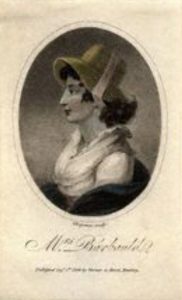42 Biography: Anna Laetitia Barbauld

Portrait of Anna Laetitia Barbauld
Artist | John Chapman Source | Wikimedia Commons License | Public Domain
(1743-1825)
Anna Laetitia Aikin Barbauld was born into a family of Presbyterian Dissenters. Her father, John Aikin, a schoolteacher and minister, took the unusual step of educating his daughter while she was still in her infancy. In addition to learning to read and write in English—not a given for women at this time—Barbauld learned French, Italian, Latin, and Greek. Joseph Priestley, poet, Dissenter theologian, and friend of the family, helped inspire Barbauld to write poetry. She privately circulated her poems. Like many women authors, she first published her poetry under the auspices of a male relative, in her case, in her brother John’s Essays on Song-Writing (1771), which included several of her poems. William Enfield, who had published comments on Joseph Priestley’s attacks on the Church of England, also included several of Barbauld’s hymns in his Hymns for Public Worship (1772). In 1773, she published Poems under her own name, a radical act at that time, and met with remarkable success.
In 1774, she married Rochemont Barbauld, a Presbyterian Dissenter convert. They opened a boarding school in Suffolk and adopted children. She herself taught at Palgrave Academy in subjects that included geography and science. Her early work focused on educating children, and education remained a strong purpose throughout her writing career in both original and edited work, including Lessons for Children (1778-79) and Female Speaker (1811), an anthology of prose and poetry for young women. Her multivolume edition of The British Novelists (1810) curated the novel genre, canonizing and giving weight to the form for future generations. Its introduction evaluated constituent elements of the novel genre, particularly plot and narrative closure.
Her “evaluation” of society—particularly of its injustices; inequalities of class, race and gender; and atrocities—shaped much of her poetry and prose. In An Address to the Opposers of the Repeal of the Corporation and Test Acts (1790), she condemned religious oppression in England in an emotionally-charged and cogent argument. She prophesied the corruption and decline of a nation that failed to abolish the abhorrent slave trade in her Epistle to William Wilberforce Esq On the Rejection of the Bill for Abolishing the Slave Trade (1791). And she vilified the English war against the French in Sins of Government, Sins of the Nation (1793).
This material is from British Literature II: Romantic Era to the Twentieth Century and Beyond by Bonnie J. Robinson from the University System of Georgia, which is licensed under a Creative Commons Attribution-ShareAlike 4.0 International License.
This license allows you to remix, tweak, and build upon this work, even commercially, as long as you credit this original source for the creation and license the new creation under identical terms.
